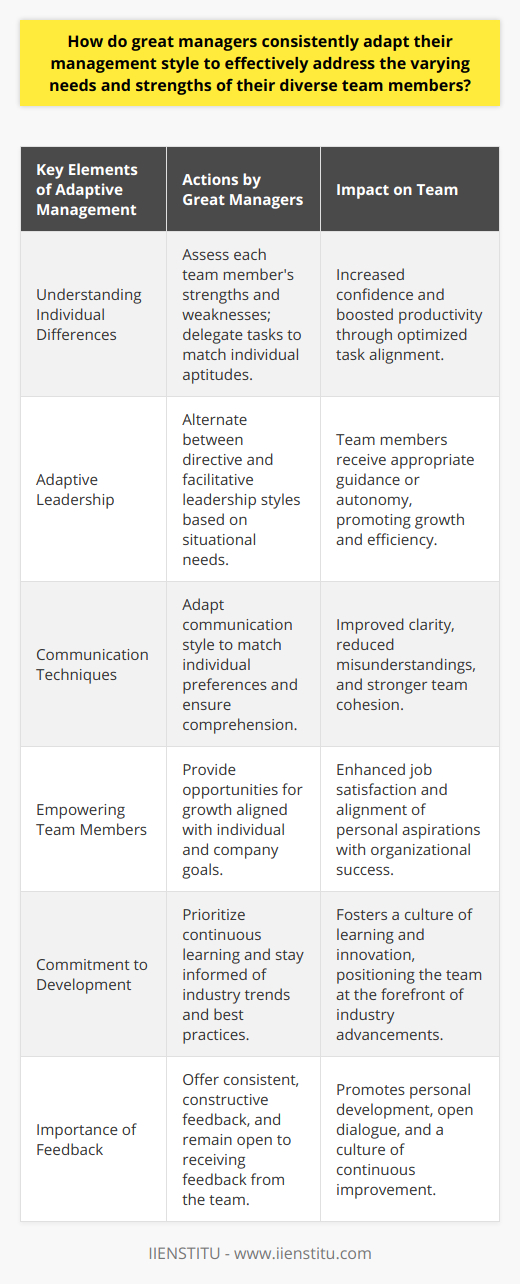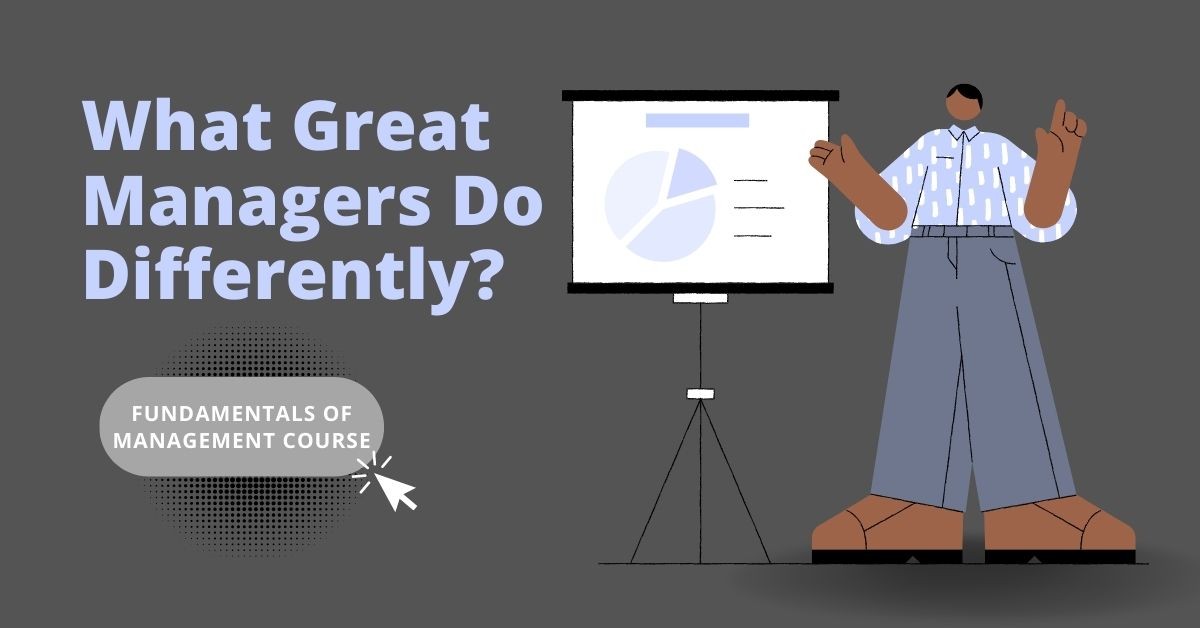
There's a reason why some managers are great at their jobs and others aren't. It's not because they're better equipped or have more experience. Rather, it's because they approach their role in a different way.
Great managers think differently than the average manager. They have a unique mindset that allows them to see the potential in their team members and unleash it. They also know how to build an effective team dynamic and inspire their employees to do their best work.
If you want to be a great manager, you need to start thinking like one. Here are some of the things that great managers do differently:
They communicate effectively
They delegate tasks effectively
They create a positive work environment
They hold their employees accountable
They are always learning and growing
They lead by example
Great Managers Communicate Effectively
Communication is key for any manager, but it's especially important for great managers. They understand that communication is a two-way street, and they make a point of listening to their team members as well as giving them feedback. This helps to build trust and keeps everyone on the same page.
Great Managers Delegate Tasks Effectively
In order to be a great manager, you need to be able to delegate tasks effectively. This means that you need to be able to identify the right tasks for the right people, and then trust them to get the job done. Great managers also know how to give clear instructions, and they stay on top of the progress of their team members’ work. By delegating tasks effectively, great managers are able to focus on important strategic goals and tasks, while still ensuring that all of their team members are productive and happy.
Great Managers Create A Positive Work Environment
A great manager is someone who can create a positive work environment for their team. This means fostering a supportive and friendly atmosphere, where employees feel comfortable taking risks and speaking up. It also means being proactive in addressing any potential problems before they become too big.
Great managers are good listeners, and they take the time to understand what their team members are saying. They also encourage their employees to give feedback, both positive and negative. This helps to build trust and communication within the team.
Finally, great managers are always looking for ways to improve their team’s performance. They set clear goals and objectives, and provide the necessary support and resources to help their team achieve them. By doing this, they help to create a sense of purpose and direction for their team.
Great Managers Hold Their Employees Accountable
A great manager is someone who can hold their employees accountable. They know how to get the best out of their team by setting high standards and expectations and making sure everyone is pulling their weight.
Managers who are able to hold their employees accountable are typically more successful than those who are not. This is because when employees know that they will be held responsible for their actions, they are more likely to take their job seriously and put in the effort necessary to succeed.
If you want to be a successful manager, it’s important to learn how to hold your employees accountable. Here are a few tips:
1. Establish clear expectations and standards
One of the best ways to hold your employees accountable is to establish clear expectations and standards. This means making sure everyone is on the same page when it comes to what is expected of them.
It’s also important to set high standards. Employees who are held to high standards are typically more successful than those who are not. So make sure you demand the best from your team.
2. Hold employees accountable for their actions
Another key to holding your employees accountable is to actually hold them accountable for their actions. This means enforcing rules and standards, and ensuring that employees are doing their job properly.
If an employee isn’t meeting your expectations, don’t be afraid to take corrective action. This may include issuing a warning or even firing the employee.
3. Provide feedback and coaching
One of the best ways to help employees meet their expectations is to provide feedback and coaching. This means giving them feedback on their performance and providing them with tips and advice on how they can improve.
Systemic coaching can be especially helpful for new employees. It can help them get up to speed quickly, and learn what is expected of them.
4. Set a positive example
Finally, one of the best ways to hold your employees accountable is to set a positive example for yourself. This means behaving in a way that you want your employees to behave, and holding yourself to the same high standards you expect from them.
When employees see that their manager is living up to the standards they’ve been set, they’re more likely to do the same.
Accountability is key to success in any organization, and the best managers know how to hold their employees accountable. If you want to be a successful manager, make sure you learn how to do the same. And if you need help getting started, IIENSTITU online fundamentals of management course can give you the skills you need to succeed.
Great Managers Always Learning And Growing
What sets great managers apart from the rest? It's their willingness to continuously learn and grow.
Most people are content to stay in their comfort zones, but great managers know that in order to be successful, they need to constantly push themselves to new levels. They're always looking for ways to improve their skills and knowledge, so that they can better lead their teams.
Great managers also have a growth mindset. They believe that their abilities can be developed through effort and dedication. This means that they're never satisfied with where they're at – they're always striving to get better.
This combination of a desire to learn and grow, along with a growth mindset, is what makes great managers so successful. If you want to be a great manager, then you need to emulate these behaviors. Start by making a commitment to learn and grow yourself, and then encourage your team to do the same. It won't be easy, but it will be worth it!
Great Managers Lead By Example
One of the most important traits of a great manager is that they lead by example. A great manager is someone who is not afraid to get their hands dirty and show their employees what it takes to get the job done. This type of leader is someone who sets the tone for their team and shows them that hard work pays off.
A great manager also knows how to delegate tasks efficiently. They understand that not every employee is going to be good at everything and that it’s important to assign tasks based on strengths and weaknesses. By doing this, managers can ensure that each task is completed properly and efficiently.
Finally, great managers are always looking for ways to improve. They are constantly trying to find new ways to motivate their employees and make their jobs easier. By constantly innovating, they are able to keep their team engaged and excited about their work.
If you want to be a great manager, start by leading by example. Show your employees that you are willing to work hard and that you believe in the importance of doing a good job. Then, delegate tasks efficiently and always be on the lookout for ways to improve. With these tips, you’ll be well on your way to becoming a great leader.
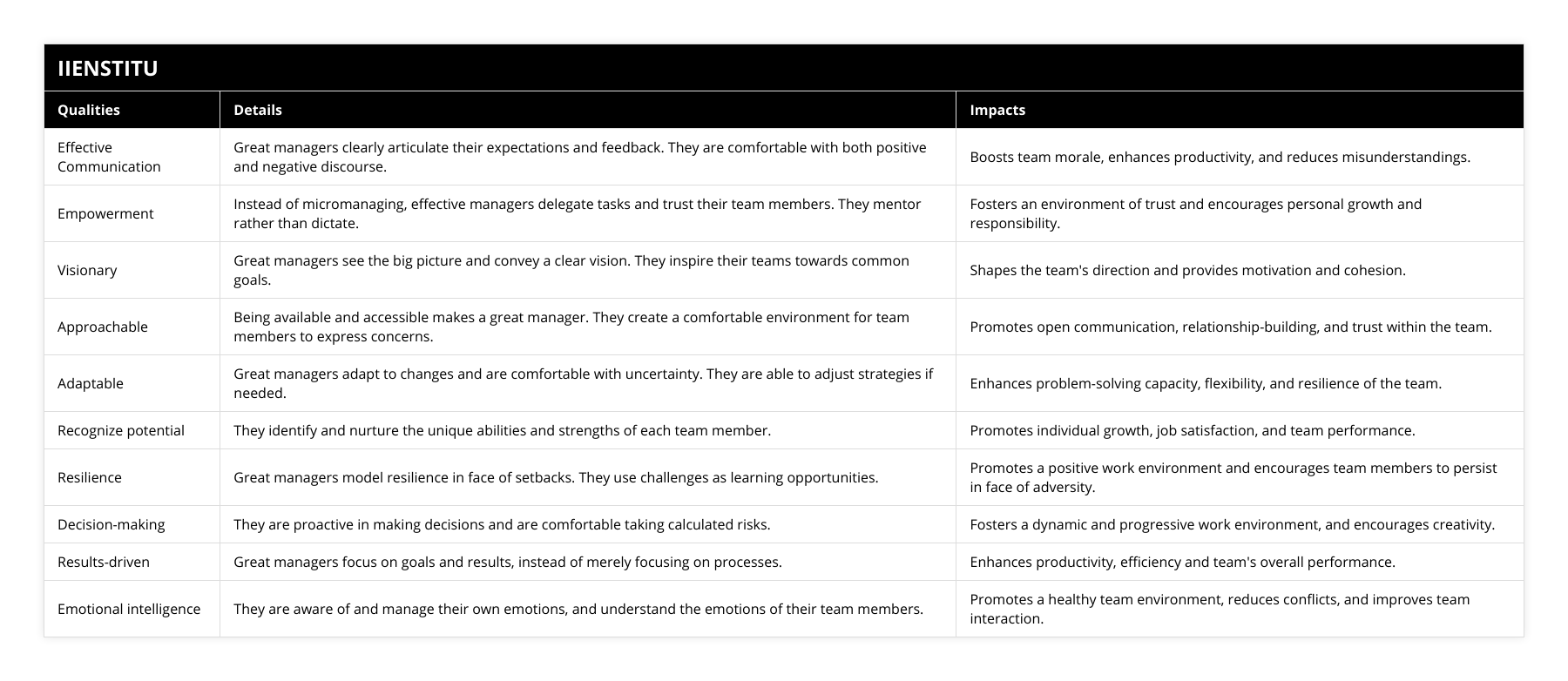
Frequently Asked Questions
What makes a great manager?
Great managers have a unique mindset that allows them to see the potential in their team members and unleash it.
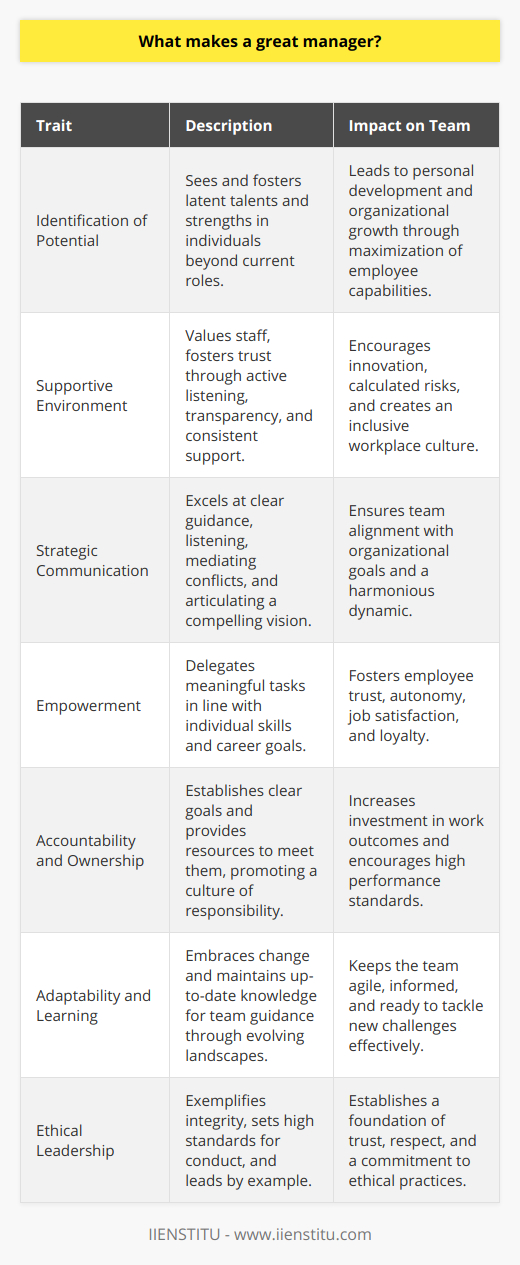
How can you become a better manager?
In order to be a great manager, you need to first communicate effectively, delegate tasks effectively and create a positive work environment, hold their employers accountable, lead by example and continously they learn and growing.

How can you create a positive work environment for your team?
A great manager is someone who can create a positive work environment for their team by fostering a supportive and friendly atmosphere, where employees feel comfortable taking risks and speaking up.

What are the key characteristics that set great managers apart from their peers?
Key Traits of Great Managers
Effective Communication Skills
Great managers have exceptional communication skills that set them apart from their peers. They can convey information and ideas clearly and efficiently, ensuring team members understand their roles, responsibilities, and expectations. Active listening and empathy are critical components of their communication style, enabling them to grasp team members' perspectives and address concerns promptly.
Adaptability and Flexibility
The rapidly changing business landscape requires great managers to be adaptable and flexible in their decision-making processes. They possess the ability to reassess priorities, re-strategize, and re-focus on achieving their team's goals in the face of challenges and unexpected events. Moreover, they welcome new perspectives and are open to change and innovation.
High Emotional Intelligence
Great managers exhibit high emotional intelligence, which includes skills in self-awareness, self-regulation, motivation, empathy, and social skills. These abilities enable them to understand and manage their emotions, maintain a positive attitude, effectively navigate social networks, and build strong working relationships with their team members. By fostering trust and collaboration, they create a supportive and productive work environment.
Strategic Thinkers and Problem Solvers
An essential ability that sets great managers apart is their strategic thinking and problem-solving skills. They effectively analyze problems and situations, identify potential solutions, and make informed decisions that align with organizational goals. They also anticipate future trends and developments that may impact the team or the organization, and plan accordingly.
Delegation and Empowerment
Great managers recognize the importance of delegation and empowerment in achieving the team's goals. They possess the ability to assess the strengths and weaknesses of individuals, distribute tasks accordingly, and ensure that every team member has the necessary resources and support to succeed. By allowing individuals to take ownership and responsibility for their work, great managers foster a sense of autonomy and drive, ultimately leading to increased motivation and job satisfaction.
Continuous Learning and Development
Lastly, great managers continually invest in their personal and professional growth, as well as the growth of their team members. They actively participate in training programs, workshops, and seminars, and encourage their employees to do the same. By fostering a learning culture within the organization, they ensure that the team stays up-to-date with the latest industry trends and best practices, ultimately enhancing the overall performance and success of the team.
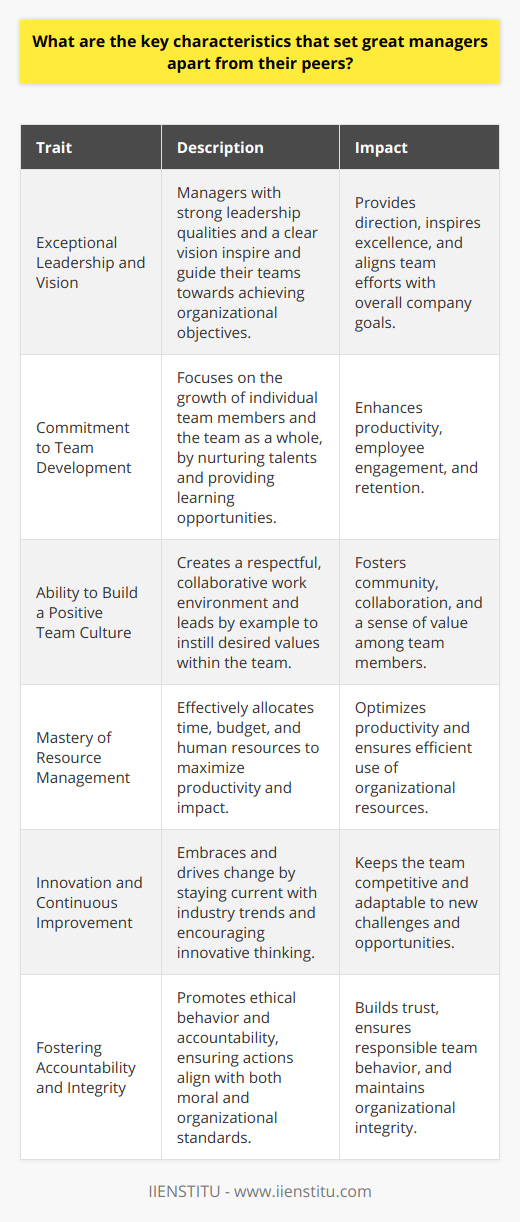
How do great managers effectively balance their managerial and leadership roles?
Balancing Managerial and Leadership Roles
Defining Roles and Responsibilities
Great managers recognize the distinction between their managerial and leadership roles. Managerial tasks involve planning, organizing, and executing daily operations, while leadership focuses on motivating, inspiring, and engaging team members toward a shared vision. To effectively balance these roles, great managers must clearly define their responsibilities and communicate them with their teams.
Delegating Tasks
One crucial strategy great managers employ is delegation. By assigning specific tasks to competent team members, managers can prioritize their time and energy on both managerial and leadership responsibilities. Delegation not only reduces the manager's workload but also empowers team members, fostering a sense of ownership and involvement in the decision-making process.
Adapting to Situational Demands
Outstanding managers understand that balancing their roles requires adaptability. They recognize the need to switch between their managerial and leadership functions based on situational demands. For instance, during a crisis, they may prioritize their leadership role to provide guidance and support to their team. Alternatively, when projects require close monitoring or a detailed analysis, they focus on their managerial tasks to ensure the efficiency and effectiveness of their team's efforts.
Continuous Learning and Development
Effective managers acknowledge that their success relies on continuous learning and development. They consistently invest time and effort in enhancing their management and leadership skills by participating in professional development programs, attending relevant conferences, and seeking feedback from their teams.
Building Trust and Relationships
Ultimately, a successful balancing act is built on the foundation of trust and strong relationships between the manager and their team. By demonstrating empathy, providing constructive feedback, and being actively involved in their member's development, managers build a positive work environment. This allows them to navigate between their managerial and leadership roles more seamlessly, ultimately enhancing the overall performance and success of the team.
In conclusion, great managers effectively balance their managerial and leadership roles by understanding the distinction, delegating tasks, adapting to situational demands, engaging in continuous learning, and building trust and relationships within the team. By carefully executing these strategies, they can navigate the complex and ever-changing landscape of organizational management and lead their teams to success.
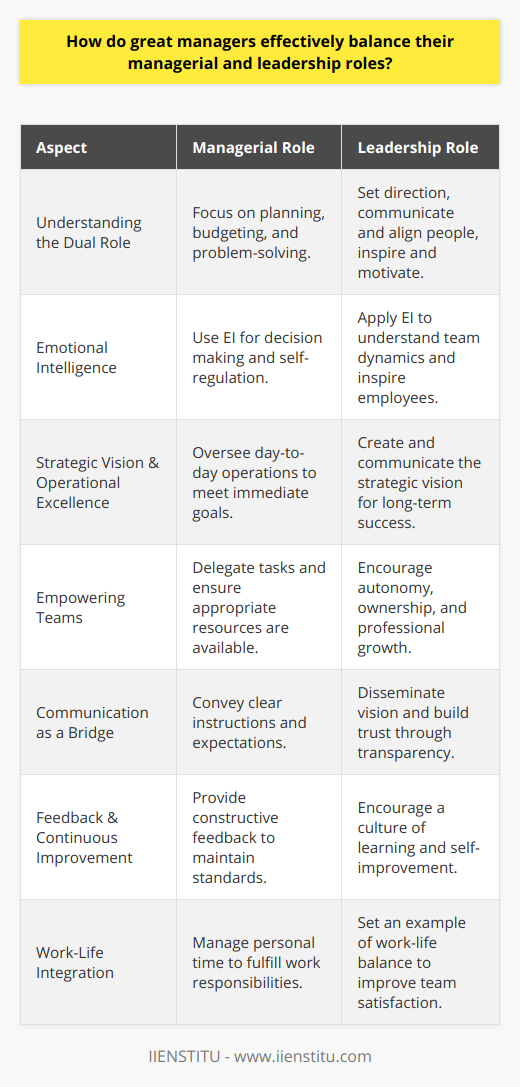
What are the most significant differences between the approaches of great managers and merely good managers?
Distinguishing Management Approaches
One of the most significant differences between great and merely good managers lies in their approach to decision-making. Great managers meticulously analyze the various aspects of a situation and rely on data-driven conclusions, while good managers may lean more toward intuition or prior experience. This inherent ability of great managers to make well-informed decisions ultimately translates to more effective outcomes for their teams and organizations.
Adaptability and Learning
Another key characteristic that distinguishes great managers from good ones is their adaptability and willingness to learn. Great managers recognize that change is inevitable and embrace it, consistently seeking to innovate and improve their skills. Good managers, on the other hand, may be more resistant to change or comfortable with routine approaches. This adaptability enables great managers to anticipate future challenges and proactively address them, ensuring continued success for their teams.
Team Empowerment
The approach to team management is another notable difference between great and good managers. Great managers empower their teams by promoting autonomy and trust, allowing employees to explore their creativity and take ownership of their work. Such an approach often leads to increased motivation and job satisfaction among team members. Merely good managers, however, may exhibit more controlling and micromanaging tendencies, which can stifle employee growth and innovation.
Communication and Vision
Effective communication is essential for any successful leader, but great managers take this skill to another level. They excel at articulating the vision and goals of the organization with clarity and passion, inspiring their teams to embrace this vision and align their efforts accordingly. Good managers may struggle with communicating their ideas or rallying their teams around a collective goal, resulting in lower levels of commitment and engagement from team members.
The Emotional Intelligence Factor
Lastly, great managers are often differentiated from good managers through their higher emotional intelligence. This heightened sense of self-awareness and empathy allows great managers to effectively manage interpersonal relationships and create inclusive working environments. They are attuned to the emotional needs and motivations of their employees, motivating them to excel. Good managers may lack this emotional sensitivity or struggle to build strong interpersonal relationships, limiting their team's overall performance.
In summary, the most significant differences between great and merely good managers can be found in their decision-making capabilities, adaptability, approach to team management, communication skills, and emotional intelligence. These qualities enable great managers to drive exceptional performance and foster a thriving work environment for their teams.
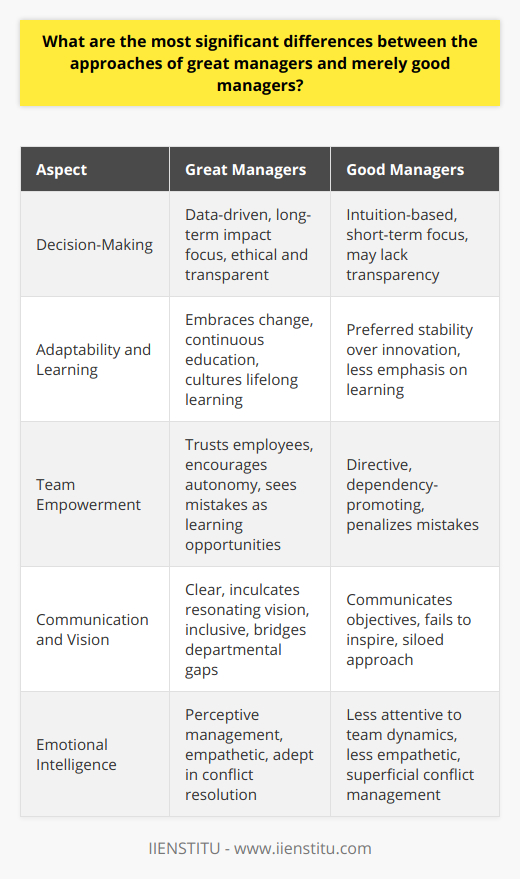
What is the difference between a good manager and a great manager?
Defining Good and Great Managers
A notable distinction between a good manager and a great manager lies in their individual attributes, leadership styles, and the resulting impact on their teams. Essentially, a good manager possesses the necessary organizational skills, a solid work ethic, and the ability to make informed decisions to effectively manage a team. On the other hand, a great manager exhibits exceptional leadership qualities extending beyond fulfilling their basic duties; they inspire and motivate their team towards achieving collective goals.
Communication and Interpersonal Skills
While good managers maintain professional communication with their team members, great managers prioritize fostering strong interpersonal relationships. They engage in open and transparent dialogue with team members, ensuring concerns and suggestions are heard, valued, and appropriately addressed). This approach results in a more collaborative working environment and leads to high levels of trust and rapport among team members.
Empathy and Emotional Intelligence
A key factor in differentiating a great manager from a merely competent one is their level of emotional intelligence. Great managers are emotionally attuned to their team's needs and sentiments, enabling them to be empathetic and supportive. This understanding helps to better manage conflicts, offer effective guidance, and foster a positive work environment, ultimately contributing to increased job satisfaction and overall team performance.
Adaptability and Flexibility
Another hallmark of a great manager is their ability to adapt and be flexible in handling challenges and diverse situations. Great managers understand that each team member's needs are different and respond accordingly with tailored approaches. This adaptability and flexibility enable them to navigate difficult situations more effectively and maintain team cohesion even amid unforeseen challenges.
Investing in Employee Growth
While good managers primarily focus on meeting short-term objectives, great managers prioritize employee development, recognizing the long-term benefits. They invest time and resources in team members' growth through continuous learning opportunities, consequently building stronger and more competent teams. This investment in employee growth not only ensures the team's future success but also fosters loyalty and staff retention.
In conclusion, the difference between a good manager and a great manager lies in their abilities to inspire, empathize, adapt, and invest in their team's professional development. Though good managers are adept at meeting organizational goals, great managers excel in creating an environment where team members feel valued, supported and motivated to contribute to the organization's long-term success.
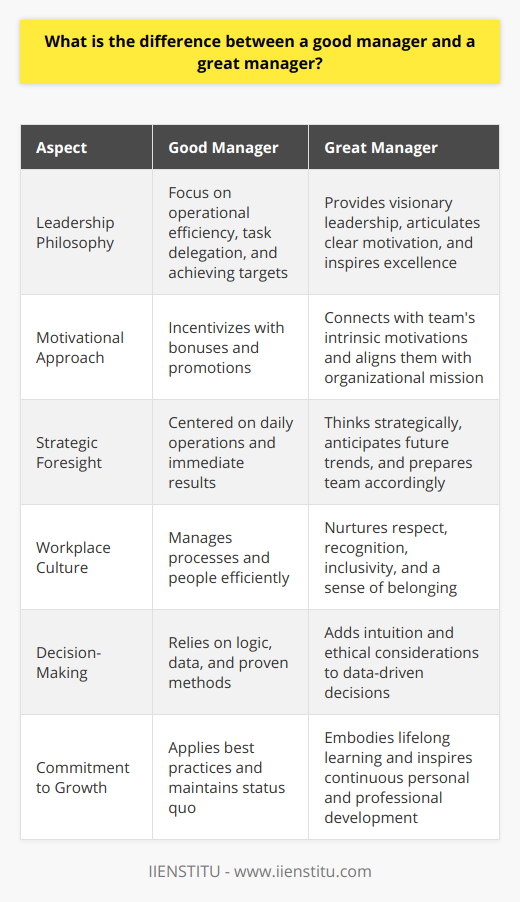
How do great managers effectively balance their managerial and leadership roles?
Balancing Managerial and Leadership Roles
Understanding Dual Responsibilities
Great managers effectively balance their managerial and leadership roles by understanding the distinctions and interconnectivity between these dual responsibilities. Managerial tasks involve planning, organizing, and controlling resources to achieve organizational goals. Leadership tasks entail influencing, inspiring, and guiding others to realize their potential and contribute to team success.
Adopting a Situational Approach
Effective managers adopt a situational approach, adjusting their behavior and focus depending on the needs of their team and organization. This involves identifying when a more directive, managerial approach is necessary and when a supportive, empowering leadership style would be more beneficial. Adapting their approach allows managers to meet the diverse needs of individual team members.
Fostering a Positive Work Environment
Creating a positive work environment is crucial to balancing managerial and leadership roles. Great managers promote open communication, trust, and collaboration. By fostering an environment where employees feel comfortable expressing their opinions and are confident in their abilities, managers build strong relationships and effectively develop their team.
Empowering Team Members
Great managers empower their team members by providing them with the tools, resources, and authority needed to accomplish their tasks. Empowering employees enhances innovation, job satisfaction, and commitment, further promoting team success. This shift from controlling to enabling employees involves trust and recognition, highlighting the importance of leadership skills in effective management.
Embracing Continuous Improvement
A key aspect of balancing managerial and leadership roles is embracing continuous improvement. Great managers commit to honing their skills, staying current with industry trends, and seeking feedback from their team. By remaining open to growth and learning, managers exemplify the importance of continuous improvement and encourage their team to follow suit.
In conclusion, great managers effectively balance their managerial and leadership roles by understanding the distinctions and interconnectivity between these responsibilities, adopting a situational approach, fostering a positive work environment, empowering their team members, and embracing continuous improvement. By integrating both managerial and leadership skills, these managers successfully guide their teams towards achieving organizational goals.

What are the most significant differences between the approaches of great managers and merely good managers?
Distinguishing Management Approaches
Great managers consistently exhibit qualities that differentiate them from those who simply fall into the category of good management. Chief among these distinctions is their approach to decision-making, communication, and employee development. Identifying and understanding these differences can provide insight into what elevates a manager's performance from good to great.
Decision-Making Methods
One significant difference in approach lies in decision-making. Great managers tend to adopt a more collaborative approach, involving their teams in the decision-making process through active engagement, soliciting feedback, and promoting open discussion. This inclusive method not only helps managers make more informed decisions but also fosters a sense of collective ownership, boosting team cohesiveness and motivation. In contrast, merely good managers may rely more heavily on their intuition, making decisions independently and communicating them down the hierarchy without seeking input from team members.
Communication Styles
Another critical distinction is communication style. Great managers consistently demonstrate effective communication skills by actively listening, articulating expectations clearly, and providing thoughtful feedback. Furthermore, they recognize the power of nonverbal cues and are adept at adapting to the communication preferences of their team members. Good managers, on the other hand, may struggle with active listening or providing constructive feedback, ultimately hindering the team's understanding and collaboration.
Employee Development Focus
Lastly, great managers possess a profound commitment to employee development. They take a vested interest in each team member's growth and performance, nurturing their strengths and providing opportunities for them to expand their skill sets. Additionally, they offer timely, constructive criticism and acknowledge accomplishments. On the other hand, good managers may focus primarily on immediate concerns, such as meeting targets or adhering to deadlines, without devoting adequate attention to the long-term development of their employees.
In conclusion, the most significant differences between great and merely good managers lie in their decision-making methods, communication styles, and focus on employee development. By critically examining these differences, one can begin to understand the qualities and behaviors that propel managers from competent to exceptional in the eyes of their teams and organizations.

What is one distinctive approach that great managers utilize to motivate and engage their teams?
Distinctive Approach: Transformational Leadership
One distinctive approach that great managers use to motivate and engage their teams is transformational leadership. This leadership style differs from others as it focuses on inspiring and empowering team members by encouraging personal and professional growth.
Role Modeling and Vision
Great managers who practice transformational leadership often serve as role models, demonstrating the values, attitudes, and behaviors they expect from their team members. By setting an example for team members, these managers create a sense of shared purpose and direction.
Inspirational Motivation
Transformational leaders are skilled at communicating a clear and inspiring vision for their team. By articulating an achievable, yet challenging, set of goals, these managers instill a sense of excitement and enthusiasm to drive team progress.
Intellectual Stimulation
Another important aspect of this approach is the encouragement of critical thinking and innovation. Instead of sticking to the status quo or only following established procedures, transformational leaders actively support the exploration of new ideas and approaches to problem-solving.
Individualized Consideration
Great managers using the transformational leadership approach show genuine concern for the well-being and development of their team members. They take the time to listen, understand, and help each team member grow, creating an environment where individuals feel valued and are more likely to stay engaged and committed.
Cultivating Trust and Collaboration
Through the above techniques, transformational leaders build trust and create a supportive work environment. This encourages open communication, collaboration, and decision-making, ultimately leading to a highly motivated and engaged team.
In conclusion, transformational leadership is a compelling approach employed by great managers to motivate and engage their teams. By being role models, inspiring team members, promoting intellectual stimulation, providing individualized attention, and fostering trust and collaboration, these leaders have a profound impact on their teams and organizational success.
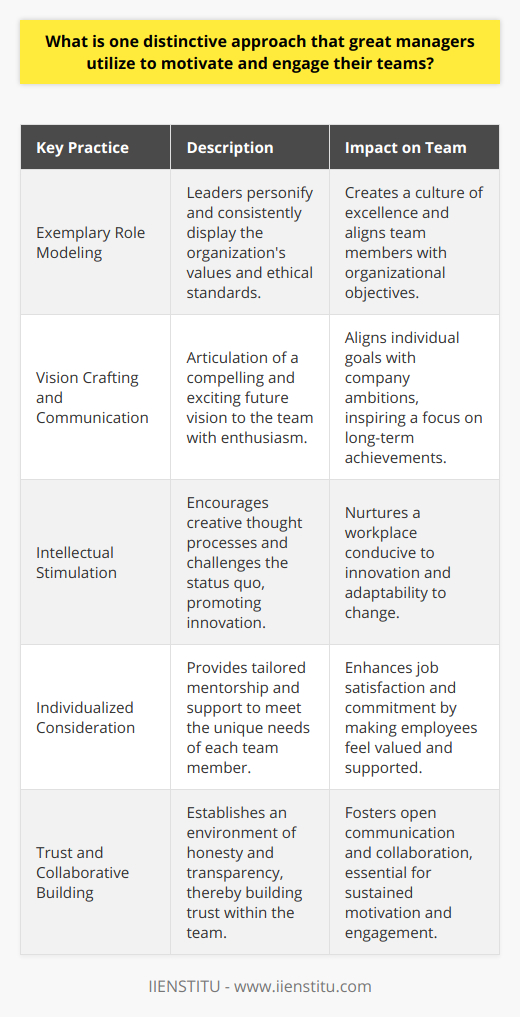
How do great managers create a culture of continuous improvement and innovation within their organizations?
Creating a Learning Environment
Great managers establish a culture of continuous improvement and innovation within their organizations by fostering a learning environment. They accomplish this by encouraging open communication, teamwork, and risk-taking. In turn, employees feel safe to share ideas, collaborate, and experiment with new approaches.
Setting Clear Goals
To facilitate a culture of continuous improvement, great managers establish clear, measurable goals that align with the organization's strategic objectives. Employees become motivated to pursue these targets, understanding that their achievements contribute to the organization's overall success. Additionally, great managers continuously evaluate and adjust goals based on changing market conditions and employee feedback.
Offering Opportunities for Growth
Great managers recognize that an organization's ability to innovate and improve stems from the abilities of its employees. As a result, they prioritize employee development by providing opportunities for training, mentoring, and skill-building. This focus on growth not only enhances employees' capabilities but also fosters a culture of continuous learning and innovation.
Recognizing and Rewarding Efforts
Acknowledgment and incentives play a crucial role in promoting ongoing improvement. Great managers consistently recognize and reward employees who demonstrate creativity, innovation, and progress toward established goals. By celebrating achievements, managers reinforce the importance of continuous improvement and inspire employees to sustain their efforts.
Embracing Change
Organizational agility is paramount for continuous improvement and innovation. Great managers proactively embrace change and encourage employees to adapt to new processes, technologies, and market trends. By instilling a mindset of adaptability, managers ensure their organizations remain competitive and evolve in response to changing environments.
Encouraging Collaboration
A culture of continuous improvement and innovation thrives in organizations where diverse perspectives are valued. Great managers promote collaboration by encouraging cross-functional teams, idea-sharing, and group problem-solving. By fostering a culture of teamwork, they facilitate collective learning and unlock greater potential for innovation.
Removing Barriers
In order to maintain a culture of continuous improvement, great managers actively work to eliminate barriers that impede progress. This may involve streamlining processes, addressing resource limitations, or dismantling hierarchical structures that hinder communication. By removing obstacles, managers empower employees to focus on innovation and growth.
In conclusion, great managers create a culture of continuous improvement and innovation by fostering a learning environment, setting clear goals, offering opportunities for growth, recognizing and rewarding efforts, embracing change, encouraging collaboration, and removing barriers. These actions collectively promote a forward-thinking, adaptable, and innovative workforce, ultimately driving an organization's long-term success.
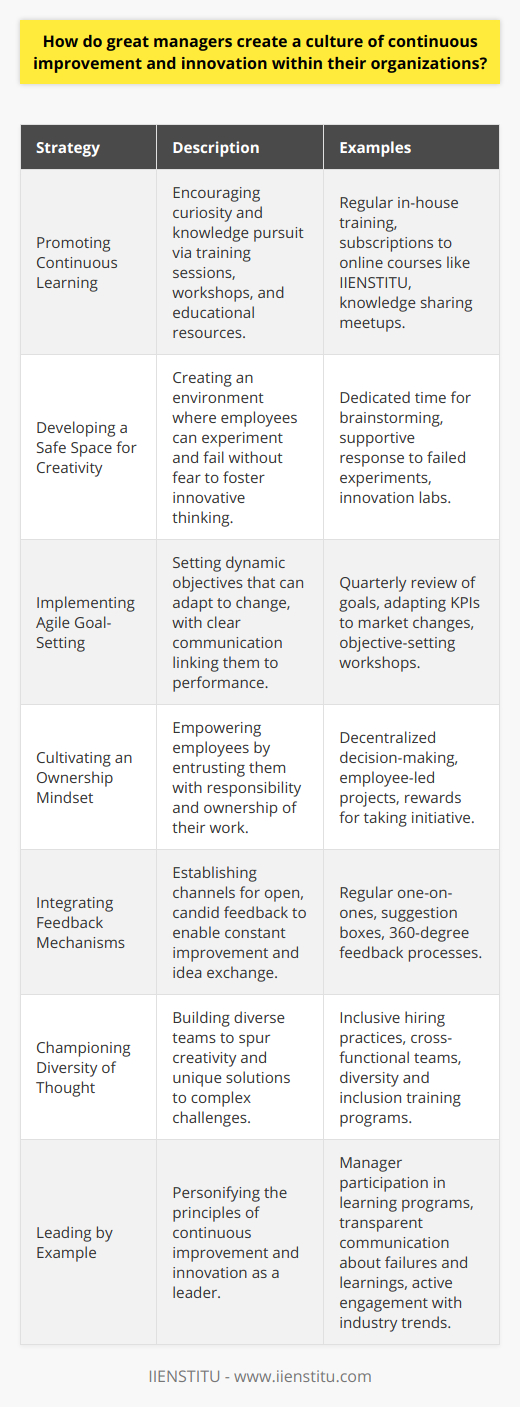
What specific strategies do great managers implement to foster open communication and collaboration among team members?
Creating a Conducive Environment for Communication
Great managers cultivate open communication by establishing a safe environment where team members feel comfortable voicing their opinions and ideas. This is achieved by implementing a culture of psychological safety, in which individuals are encouraged to speak up without fear of retribution or judgment.
Encouraging Diverse Perspectives
To foster a collaborative atmosphere, effective leaders promote the sharing of diverse perspectives within their teams. They actively seek out input from team members with different backgrounds and experiences, aiming to create a rich pool of ideas that can be leveraged to enhance decision-making processes.
Emphasizing Active Listening
In order to facilitate open communication, great managers emphasize the importance of active listening. They model this behavior by attentively focusing on the speaker, asking clarifying questions, and providing feedback to ensure understanding. Additionally, they encourage their team members to practice active listening during workplace interactions.
Incorporating Team-Building Activities
Engaging in team-building activities is another strategy employed by successful managers to strengthen communication and collaboration. By organizing events and exercises that require collective problem-solving and cooperation, managers help to build rapport and trust among team members. This, in turn, creates a foundation for open communication and mutual support.
Utilizing Effective Digital Tools
In today's digital age, great managers recognize the importance of leveraging technology to support open communication and collaboration. They select digital tools such as instant messaging platforms, video conferencing systems, and project management software to facilitate seamless information sharing and maintain engagement among team members, regardless of their location.
Fostering Feedback Culture
Lastly, managers promoting open communication recognize the value of constructive feedback in fostering collaborative work environments. They encourage team members to regularly share feedback with one another, ensuring that it is specific, timely, and actionable. Moreover, they maintain an open-door policy for employees to discuss any concerns or suggestions for improvement.
In summary, great managers utilize a combination of strategies to cultivate open communication and collaboration within their teams. By creating a supportive environment, promoting diverse perspectives, and leveraging technology, effective leaders empower their team members to work together effectively and achieve collective success.
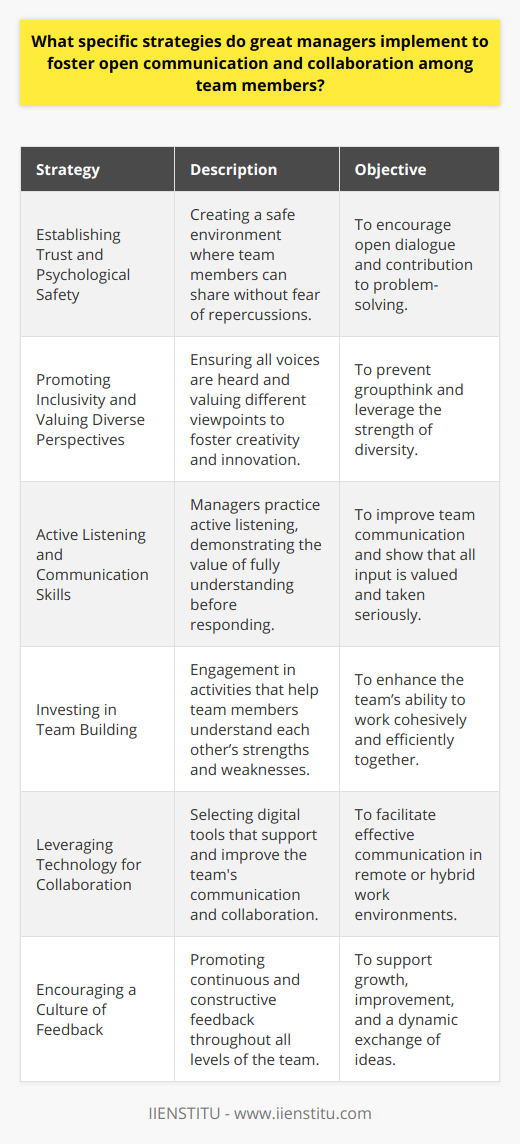
What is one thing a great manager does differently to ensure high employee morale and job satisfaction?
Creating a Supportive Environment
One distinct characteristic of a great manager that significantly contributes to high employee morale and job satisfaction is their ability to create a supportive environment within the workplace. A supportive environment encompasses various aspects, with the most essential including open communication, recognition of employees’ efforts, and encouragement of professional growth.
Fostering Open Communication
Great managers understand the value of open and honest communication channels for sharing ideas, concerns, and feedback. They actively encourage their employees to voice their opinions and make efforts to listen, understand, and address their needs. This approach eliminates hierarchies that might prevent employees from expressing their thoughts, consequently fostering a sense of belonging and loyalty to the organization.
Acknowledging Employee Efforts
Moreover, recognizing employees' efforts by acknowledging achievements or providing constructive feedback is another crucial aspect of a supportive environment. Great managers know that praise and rewards, both monetary and non-monetary, play an indispensable role in boosting employee morale. By appreciating their contributions, employees feel valued and motivated to maintain high performance levels, leading to increased job satisfaction.
Encouraging Professional Growth
Finally, great managers prioritize their employees' professional growth and development. This can involve providing relevant training opportunities, offering resources for skill development, and setting clear pathways for career advancement. By doing so, managers demonstrate their vested interest in their employees' success, fostering an environment in which employees feel challenged, engaged, and fulfilled in their work.
In conclusion, a great manager sets themselves apart by creating a supportive environment that promotes open communication, acknowledges employee efforts, and encourages professional growth. These elements contribute to a healthy work culture, ultimately leading to high employee morale and job satisfaction.
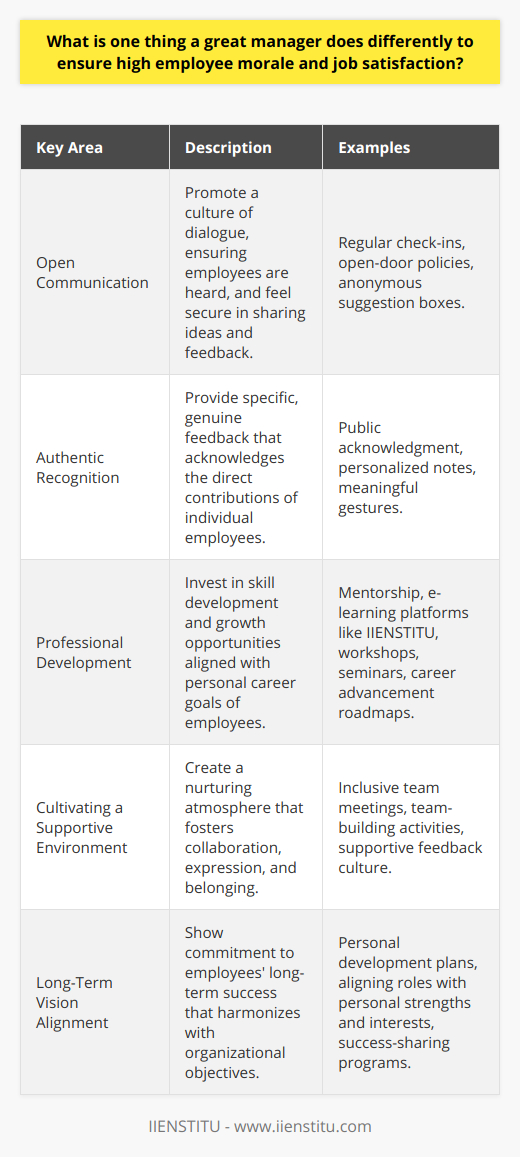
What do you think a manager can do differently to adapt to diverse team dynamics and ensure work harmony?
Understanding Cultural Differences
A crucial aspect a manager can undertake is to comprehend the team members' varying cultural backgrounds. By understanding cultural variations and fostering open communication, the manager can effectively address misunderstandings and create a more inclusive work environment. Promoting cultural awareness through workshops and interactive sessions can significantly benefit the team and enhance harmony.
Effective Communication
Another component for managing diverse team dynamics is adopting clear and concise communication strategies. The manager can establish regular forums for open dialogue, generate individual and group feedback opportunities, and ensure the team understands common goals, expectations, and objectives. Using simple language and avoiding complex terms or jargon can also promote a better understanding among team members.
Flexibility in Management Approach
In response to diverse team members, the manager should exhibit adaptability in management style. This flexibility can involve varying leadership techniques, problem-solving strategies, and decision-making processes to accommodate different cultural and personal preferences. Encouraging employee participation and valuing diverse perspectives can also contribute to improved work harmony.
Empathy and Emotional Intelligence
To foster a harmonious working environment, the manager should display empathy and emotional intelligence. By being sensitive to the emotions, perspectives, and needs of each team member, the manager can build trust and openness within the team. Acknowledging and validating employee concerns can lead to a more cohesive and well-functioning team.
Conflict Resolution
Conflicts are inevitable in any team, and the manager should establish a consistent method for addressing and resolving disputes. Developing procedures that are fair, transparent, and unbiased can provide all team members with a sense of equity. The manager should also be proactive in identifying potential issues and addressing them before they escalate, promoting work harmony.
In conclusion, managing a diverse team effectively involves understanding cultural differences, fostering clear communication, displaying flexibility, employing empathy, and establishing a consistent conflict resolution approach. By practicing these components, a manager can adapt to diverse team dynamics and ensure work harmony.
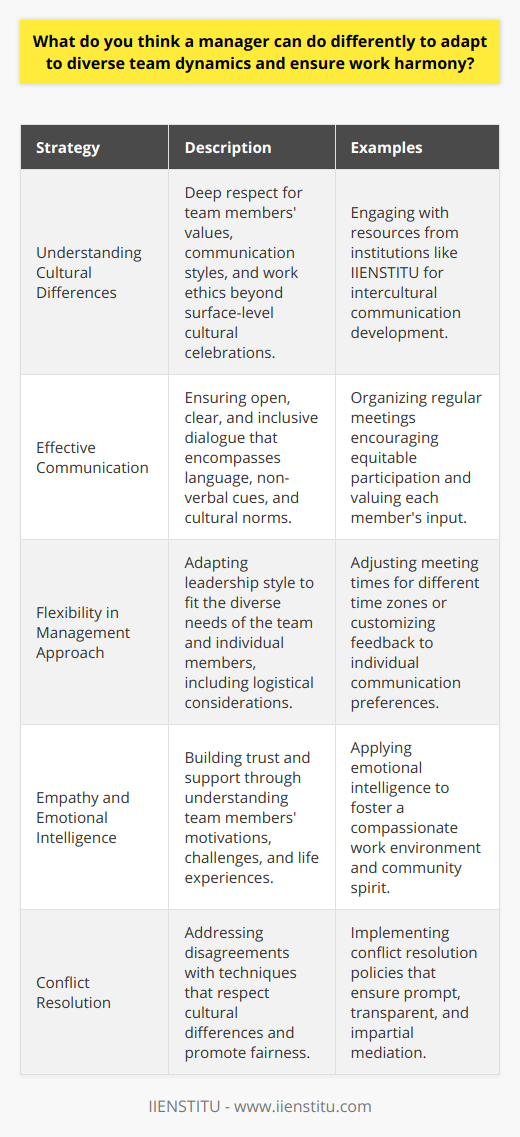
What are great managers able to do that is different from what great leaders do in terms of fostering a culture of learning and growth within their organizations?
Distinct Approaches of Managers and Leaders
Great managers and great leaders may seem similar, but they approach fostering a culture of learning and growth differently within their organizations. Their methods complement each other and contribute to an organization's overall success by promoting employee development and adaptability.
Managerial Focus on Individual Development
Great managers primarily focus on the individual growth of their team members. They pay close attention to their employees' strengths and weaknesses and provide tailored support, coaching, and constructive feedback. This individualized attention facilitates personal development and enables employees to excel in their current roles. Great managers also offer opportunities for skill-building and career advancement, further ensuring each employee's long-term growth and success.
Leader's Role in Establishing Vision and Culture
Contrarily, great leaders concentrate on creating an inspiring vision and a conducive environment wherein learning and growth can naturally occur. They set expectations for continuous improvement, encourage innovation, and promote a growth mindset throughout the organization. By being an example of embracing learning opportunities and maintaining a positive outlook, great leaders inspire their followers to commit to ongoing self-improvement.
Collaboration for a Holistic Approach
While their focuses might be different, the collaboration between great leaders and great managers enhances the overall culture of learning and growth in an organization. Their combined efforts create an environment where both individual development and organizational progress intertwine harmoniously. Together, leaders and managers work to reinforce the significance of lifelong learning and support employees in reaching their full potential.
In conclusion, great managers and leaders each employ distinct strategies towards fostering a culture of learning and growth within their organizations. Great managers attend to individual employee development, while great leaders establish and maintain the overall learning culture. Their combined efforts create an environment where employees can thrive and adapt to organizational changes, striving for collective success in the long run.
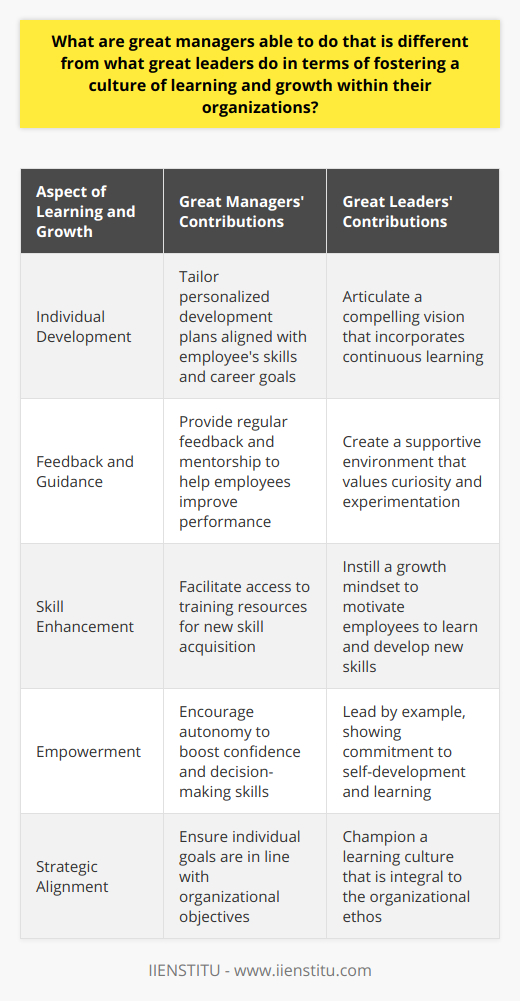
What do managers do differently in order to maximize their team's productivity and accomplish organizational goals?
Effective Leadership Strategies
Good managers employ effective leadership strategies to boost team productivity and achievement of organizational goals. They clearly communicate their expectations and regularly provide constructive feedback. This ensures all team members understand their roles and responsibilities.
Delegation of Tasks
Proper distribution of tasks among team members is another critical strategy. A good manager delegates responsibility based on an individual's skills and potential. This encourages employees to take ownership and boosts the efficiency of task completion.
Promotion of Team Collaboration
Creating an environment that encourages teamwork and collaboration is another method adopted by managers. The open exchange of ideas and knowledge enhances innovation and problem-solving capabilities in a team, which drives productivity.
Training and Development
Managers also focus on the professional development of their team, providing employee training and growth opportunities. This not only promotes employee satisfaction but also equips them with updated skills to meet organizational goals.
Recognition and Reward
Managers acknowledge the efforts and achievements of their team. Using systems of recognition and reward, they motivate employees, improving their performance and productivity.
Flexibility and Work-life Balance
Offering flexibility and promoting a healthy work-life balance is another strategy that managers use. Balanced employees tend to be more productive and committed to their work.
Conflict Resolution
Effective managers also possess strong conflict resolution skills. Prompt handling of conflicts prevents a negative impact on the team's morale and performance.
By integrating these strategies, managers can maximize their team’s productivity and drive the achievement of their organization's goals.
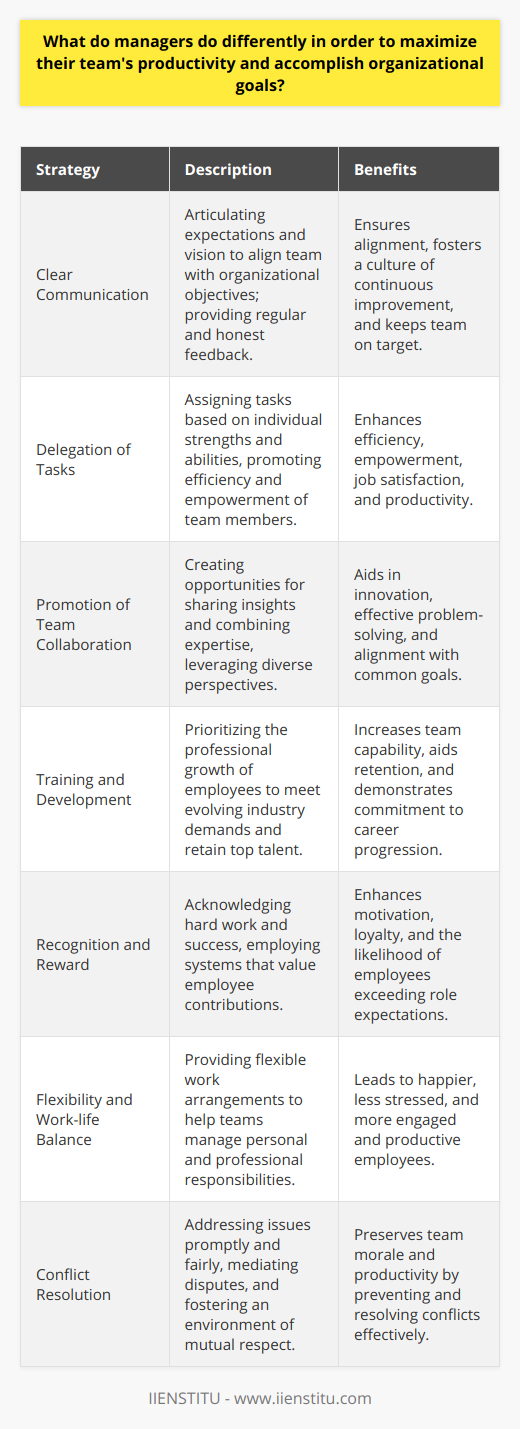
What are some unique techniques that great managers utilize to navigate challenging or complex situations while maintaining a supportive and positive work environment?
Effective Communication
Great managers leverage effective communication techniques to navigate difficult situations. They clarify project objectives, define roles and appropriately delegate tasks. They ensure open communication lines between team members, promoting a cooperative and collaborative work environment.
Emotional Intelligence
Another unique technique is emotional intelligence, which involves understanding and managing both personal emotions and those of the team. Great managers employ emotional intelligence to sensitively navigate challenging circumstances and maintain team morale, preventing staff from being overwhelmed or demotivated.
Conflict Resolution
They are also experts in resolving conflicts. They act swiftly and fairly to address issues, consistently implementing a systematic approach. They provide constructive feedback, offer solutions, and facilitate dialogue between the conflicting parties. This practice promotes a harmonious work environment even in the face of problems.
Adaptation
Great managers are adaptable. In complex situations, they can adjust their management style dependent on the needs of the situation. They show flexibility in decision-making and demonstrate readiness to embrace new perspectives and ideas.
Active Listening
Active listening is a key technique. Managers who listen proactively can understand their employees' viewpoints and gather valuable feedback. They can catch emerging issues early, address them promptly and ultimately, maintain a supportive workplace.
Transparent Leadership
Lastly, transparent leadership is crucial. A great manager will maintain clarity about the organization's goals and the team’s progress towards them. They take the time to explain and justify decisions, fostering trust and respect among team members.
In conclusion, through effective communication, emotional intelligence, conflict resolution, adaptability, active listening, and transparent leadership, great managers can successfully navigate challenging situations while fostering a positive work environment.
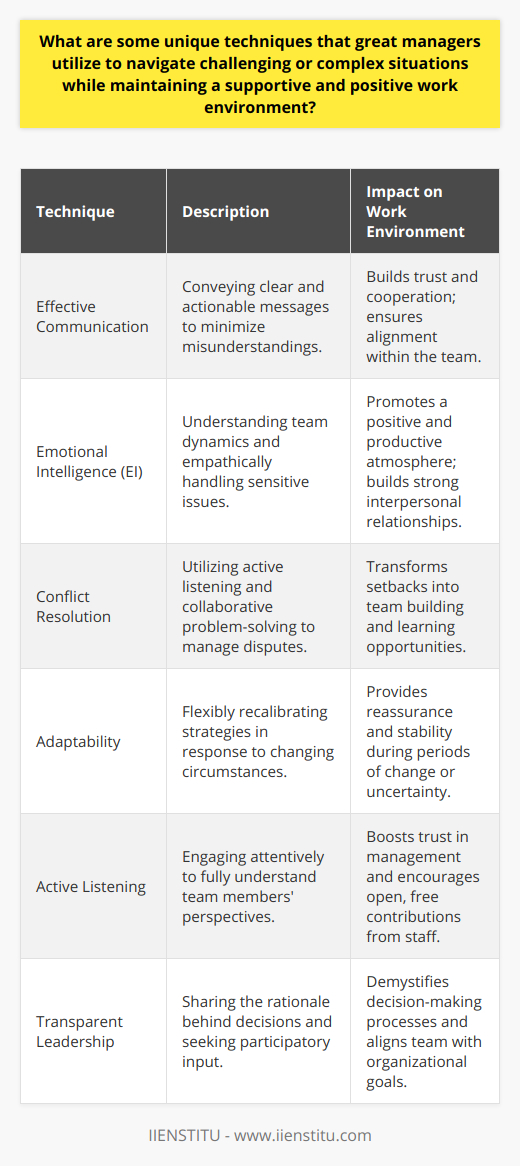
How do great managers consistently adapt their management style to effectively address the varying needs and strengths of their diverse team members?
Understanding Individual Strengths
Great managers understand that effective leadership is not one-size-fits-all. They discern that their team members are diverse, and so must their management style be. By taking the time to understand and value individual strengths, they can tailor their leadership style to match their teams' unique abilities and potentials.
Adaptive Management Techniques
Key to this is the use of adaptive management techniques. Successful managers maintain a willing readiness to alter their approach. They prioritize the motivational triggers of their teams, and style their management strategies around these needs, fostering an environment of inclusivity.
Effective Communication Styles
Moreover, effective communication styles play a critical role. Superior managers adapt their communication style to meet their team members at their points of understanding. They simplify technicalities and speak the language of their team, enhancing better comprehension and increased productivity.
Leadership Approach
These managers also vary their leadership approach, knowing when to be directive and when to be supportive. They ensure they balance between team autonomy, with structured guidelines, duties and responsibilities. They see the value of each team player, aligning their purpose with the organization's goals.
Continuous Learning
Furthermore, great managers look at continuous learning and improvement for both themselves and their team as a valuable management tool. They stay on top of current trends and developments in their industry and help their team members do the same.
Feedback and Response
Finally, great managers understand the power of feedback. They are open to receiving and acting on constructive feedback from their teams. Simultaneously, they provide clear and honest feedback to help employees improve performance.
To summarize, great managers maximize their effectiveness by recognizing and adapting to the diverse strengths and needs of their team. They create a thriving, inclusive environment conducive to productivity and success.
